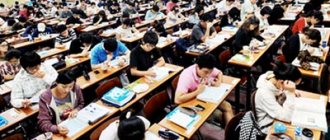The tremendous pace of development of the PRC economy over the past decades has generated a lot of debate among modern society; more and more hypotheses and assumptions are appearing about the origins of China’s powerful progress. Of course, this could not have happened without a reason and serious work by the state and representatives of the economic sector.
The national idea of the Celestial Empire is based on the principle of hard work, which will certainly lead to success. From childhood, the Chinese work hard and even after achieving a goal they do not stop working on themselves. The Chinese never stop halfway, because the main thing for them is achieving their goal. For example, during the Olympics the Chinese always strive to get gold, because other medals are not equivalent to victory.
But, of course, the state played an important role in shaping the country’s economy. First, the priorities were correctly identified: the majority of the state budget is now invested in education. Universities that bring valuable personnel to the country are almost entirely subsidized by the state. Hence the race to improve the quality of training received. The state also encourages talented students - future invaluable personnel for the country - and provides grants. They also work for international students. Secondly, primary and secondary education were declared compulsory for all. Only tough measures at the legislative level could cope with the prevalence of illiteracy.
As you know, in the early 90s in China, only 4% of the population had a higher education, only 12% received a high school diploma, and 11% had no education at all. Outstanding researchers could be counted on one hand, but prestigious universities, victories in various Olympiads and competitions were not worth even talking about. Today the situation has changed dramatically.
Benefits of Chinese Education
What was the impetus that turned China into the fastest growing country? Today, the Celestial Empire is ahead of the United States in the number of space launches, independently produces original and high-quality products, and is also a world center for advanced research and innovative projects. In 1998, the “Law on Higher Education of the PRC” was signed, which transformed the country’s universities into world-class universities, with the best professors and unique laboratories, thanks to which China can now rightfully be called an innovative miracle.
Currently, every citizen of the PRC understands that the absence of a higher education diploma means the impossibility of a normal, happy life and self-realization. This understanding determined the current situation in the country. Currently, obtaining a diploma and a sought-after specialization is the goal of every resident of the country. And they begin to achieve it from early childhood. Taking into account the incredible diligence and diligence, schoolchildren, and then students, learn an insane amount and absorb huge layers of information every day.
Features of education in China
The concept is that every student becomes a significant person in society and achieves all the good things in life. Therefore, from childhood, every citizen of the People's Republic of China knows what intensive study of material is, is able to endure nine lessons every day and spends his free time studying books in the library. And all this is accompanied by iron discipline: for 12 absences a student will be expelled, for drinking alcohol within the walls of an educational institution - expulsion with a reprimand and significant difficulties when entering other schools.
Due to high workloads and iron discipline, there are also quiet hours in schools. After lunch, students have 60-80 minutes to rest and recover. At the same time, before going on vacation, children study the exact sciences, and after a quiet hour they engage in creativity.
Education system in China
The modern Chinese education system is familiar to any European and differs little from what we are used to.
- From three to six years old, children receive preschool education in kindergartens. At this age, training in strict discipline begins.
- The child spends the next six years in primary school. There he receives basic knowledge about the world and society and for the first time tries himself as a worker.
- It takes another three years to study in secondary school. At this stage, children delve into the exact sciences, study politics, computer science and foreign languages. After graduating from high school, students are considered sufficiently savvy not to go to high school, but to receive secondary vocational education and go to work.
- The last three years of school are high school. There children are prepared for university.
Important nuances
Chinese schools are characterized by an extremely high workload for students, in comparison with similar schools in the USA, Europe and the Russian Federation. The main reason for this situation is the complexity of the language that students have to face. They have to memorize several thousand unique hieroglyphs, and this applies not only to pronunciation, but also to writing.
Calligraphy lesson in Chinese school
The number of students in each class directly depends on the prestige of the educational institution. In public institutions, it is not uncommon to find classes with 70–80 students, while in private institutions their number rarely exceeds 30.
To avoid overburdening children, the government has taken measures to limit the length of the school day. It amounted to 8 hours, with physical education devoted to at least 70 hours a week.
Traditional daily routine in a Chinese school:
- from 8 to 11 - classes in basic subjects;
- from 11 to 14 — lunch break, rest;
- from 14 to 16 - non-essential subjects.
Students often attend extracurricular classes and use the services of tutors. Due to heavy homework, schoolchildren most often go to bed closer to 12 o'clock at night. Moreover, at 7:30 am they need to be at school.
An example of a schedule for sixth grade students in one of the Chinese schools
The academic year consists of two semesters, at the end of which, students receive special final grades that reflect their performance in the disciplines. For this purpose, a 100-point scale is used, which allows assessing the student’s level of knowledge with high accuracy.
Studying in a Chinese school has a number of other interesting features:
- absenteeism of 12 or more classes without confirmation of a valid reason leads to the student’s expulsion;
- educational institutions that provide secondary education are carefully controlled by the state and receive funding for renovation of premises and technical equipment;
- Often schools are unique educational complexes, distinguished by the presence of several buildings with an impressive area.
Each of the stages of training involves certain specifics and a number of other nuances, which it is advisable to familiarize yourself with in more detail.
Pay attention to the video: education in Chinese schools.
Primary School
Upon reaching the age of 6, children go to 1st grade, and the start date for classes in China is usually considered to be September 1. The main disciplines taught at school at the initial stage are considered to be natural science, mathematics, Chinese, natural history, history and geography. In addition, the educational program includes a number of special subjects. These include information about the state itself, the peoples inhabiting it, as well as a number of political information.
Lesson at a junior school in China
In Chinese schools, students everywhere keep their classrooms clean and tidy. Starting from the 3rd grade, schoolchildren begin to study English. After a year, they begin to attend a kind of practice, which can take place both in equipped workshops and on farms.
Junior high school
Secondary school in China refers to a period of three years of study, starting from 7th to 9th grade. Upon completion, the compulsory educational part is completed, and adolescents can choose whether to continue further education. During this period, the main subjects are mathematics, physics, biology, computer science, physics, English and Chinese.
Among the non-standard subjects of this period, it is advisable to include ethics and morality, which are taught along with geography, physical education and music. In addition, in secondary school children also continue their ideological education, as well as their attendance at various clubs.
Complete high school
When planning to enter secondary school, students will have to decide on the direction of their future educational activities. The vocational and technical profile is popular among students planning to work in industrial production or agriculture.
The academic direction is in demand among those wishing to enter universities. Thanks to such a system, it is possible to reduce the duration of study in higher educational institutions in most cases to 2–4 years. At the same time, there is a graduate distribution system to guarantee their employment in China upon completion of their studies.
Watch the video: how final exams are held in Chinese schools.
Preschool education
In China, as in Russia, preschoolers attend kindergartens. They are divided into two main types: private and public. However, they differ in both the method of financing and teaching methods.
In private kindergartens, teaching focuses on an individual approach to the child, developing his creative abilities and introducing him to science and art. In state preschool institutions, children are accustomed to work, taught to cope with everyday needs and prepared for primary school.
The famous Chinese discipline is instilled in children from kindergarten. Every morning begins with the raising of the national flag, all games are strictly controlled by teachers, and there is simply no free time for idleness. Maybe this is the secret of the exceptional hard work and efficiency of the Chinese.
School education in China
We mentioned the three-stage structure of school education earlier. In general, it resembles the Russian one, except that only the first nine years of study are free. You will have to pay for high school. Primary and secondary school are compulsory stages of education. The program includes basic study of the Chinese language, mathematics, natural history, history, geography and music. Knowledge is assessed on a 100-point scale and there is a test system.
In Chinese schools, all students have the same uniform, the entrance gates are opened twice a day, and the educational process does not stop even during the holidays. After rest, students are required to submit completed homework to teachers. A common practice is to send children abroad. But not for relaxation, but for more in-depth study of a foreign language. It seems that every free minute in China is spent studying.
Those who want to go to university usually go to high school. Another important point is that before starting this stage, students take a profile test and choose a direction - vocational or academic. In academic high school, students are prepared for entering a university. Schoolchildren will receive training in serious and highly specialized disciplines that they will need at the university. Vocational High School aims to prepare future workers.
Popular schools in China
The Beijing First of October School was opened more than 60 years ago. Location: Beijing city. Education is provided here from grades 1 to 12, enrollment is possible at any stage. The school maintains strict discipline. After several violations, expulsion follows.
It is possible to teach children from foreign countries. Chinese language lessons are held for them throughout the year. After obtaining the basics of the language, you must pass entrance exams in mathematics, English and Chinese. Foreign students are provided with boarding accommodation. Tuition fee: 28,500 yuan, living cost: 6,000 yuan.
Tatyana L. (mother of student Evgenia) says that at school they liked the informal attitude towards the girl, the help in solving everyday issues, and the individual approach.
The school at the People's University of China (Beijing) is considered one of the most popular high schools in China. It is possible to train foreign students in any grade - from 1 to 12. The university specializes in the social sciences and humanities, with popular specialties: economics, journalism, and law.
The school is famous for the high results of its graduates. Most of them go to the People's University or other prestigious universities in China. For students from other countries, a one-year Chinese language course is provided, after which they take exams for admission to school. Tuition fee: 25,000 yuan, living cost: 6,200 yuan.
School No. 2 of East China Normal University is located in Shanghai. It is considered one of the best schools in this city. It is possible to teach schoolchildren from other countries aged 12-18 years. A preliminary course in Chinese language is provided, as in other similar schools.
The school has an excellent material and technical base. This includes a laboratory, an indoor swimming pool, and numerous sports facilities. The dormitory has 400 rooms for students. Tuition fee: 35,000 yuan, living cost: 5,000 yuan.
Olga S. (mother of student Lilia) from Russia says that she can safely recommend this school to everyone. She liked the area, surrounded by greenery, modern dormitory and school buildings, as well as several excellent sports grounds.
The school at Shanghai Jiaotong University is ready to accept foreign students aged 15-18 years to study in graduate classes. First, students study the basics of the Chinese language for six months and only after that can move on to the main program. Here teenagers not only study basic disciplines, but also prepare for entering a university. Tuition fee: 34300 yuan, living cost: 4000 yuan.
Dilara says that her son is happy with his studies, he made friends from different countries of the world, mastered Chinese and consolidated his knowledge of the English language. Now he plans to enter a Chinese university.
As for Russian schools in China, we can recommend the school at the Russian Embassy in Beijing.
Higher education in China
There are more than two thousand higher educational institutions in China. It is worth noting that diplomas from Chinese universities are not only valued by employers, but are also highly valued on the world stage. And this is all thanks to the fundamental approach to higher education in the Middle Kingdom.
To enter a university, schoolchildren take a national unified exam, which determines their chances of entering a university. Not only the state, but also municipalities and private companies in China are interested in increasing the number of young people with higher education. Hence the variety of grants and scholarships for studying at universities. Student loans are also common. Studying in China is becoming more accessible, but the competition for budget places is still very high, so even entering a paid department is a holiday for the whole family. A graduate diploma from a Chinese university is a guarantee of a successful career in the future.
The structure of higher education in China is the same as in Russia or Europe and consists of three levels: undergraduate, graduate and postgraduate. Bachelor's studies take four years and are the main stage of higher education. A bachelor's degree allows you to get a job in leading companies in China and around the world.
A master's degree is another two or three years of study and obtaining a first academic degree. Students admitted to the second stage of study will face serious scientific work, publication of academic materials on a chosen topic, and, finally, writing and defending a master's thesis.
Obtaining a PhD degree takes another three to four years of graduate study. This training is usually paid, but graduate students studying important or contemporary topics can count on government assistance, which encourages the growth of scientists who benefit the country.
Universities in China
The Chinese education system is very similar in classification to the Western one. There are bachelor's (4-5 years), master's (2-3 years), and doctoral programs. There are also postgraduate internships and internships in some specialties. There are fewer and fewer differences in methodology with Western universities, including due to the large number of teachers invited from abroad.
There are more than half a thousand universities in China available to foreign students. Many of these universities are included in international rankings. In addition, China has its own ranking methods, both at the federal level and within the provinces. In general, the best Universities in China can be represented by the following list:
- Peking University
- Tsinghua University
- Wuhan University
- Zhejiang University
- Fudan University
- Xidian University (西安电子科技大学)
- Huazhong University of Science and Technology (华中科技大学)
- Shanghai Jiao Tong University
- Harbin Institute of Technology (哈尔滨工业大学)
- Central China Normal University
- Hunan University (湖南大学)
- Northwestern Polytechnical University (西北工业大学)
- Tianjin University
- Sun Yat-sen University
- Beijing Institute of Technology (北京理工大学)
- South China University of Technology (华南理工大学)
- East China University of Science and Technology (华东理工大学)
Such lists, of course, help to form a quick opinion about universities. However, specialization must be taken into account first of all. Typically, universities in China specialize in one of 12 specialties: agronomy, military affairs, natural sciences, engineering, history, mathematics, medicine, management, pedagogy, philosophy, economics or law. This allows you to concentrate as much as possible on studying the main thing for each training course. When choosing a university, it is better to look not at general ratings, but at narrower ones, for institutions with a similar profile.
Study in China for foreigners
For foreigners, studying in China looks completely different. More than 400,000 students from different countries (Russia, USA, South Korea, Japan, Kazakhstan, etc.) are already studying in China. At the same time, foreign students receive benefits and more lenient living conditions.
Why? Every year, Chinese educational institutions provide hundreds of programs and grants for foreign students. The more students from other countries, the higher the university’s rating. Cooperation between universities and other countries is important for developing international business, improving relations with other countries and popularizing Chinese culture.
The differences don't end there. Unlike Chinese, foreign students live in more comfortable conditions. Every major university campus has separate dormitories for students from other countries. They are usually newer, equipped with all the necessary equipment, and the rooms in them are designed for fewer people.
But we should not forget that foreign students do not have any privileges during their studies. Iron discipline and high standards are the same for everyone. Chinese teachers do not give concessions to lazy students, and the students themselves treat such fellow students with misunderstandings. In addition, poor performance or absenteeism without a good reason may result in expulsion. Every year, Chinese universities gain leading positions in world rankings of educational institutions. This is facilitated by government support, an innovative approach and international experience in the exchange of knowledge among universities in the Middle Kingdom.
Working while studying in China
Most international students in China work part-time, although, with rare exceptions, the work is temporary or “one-off” in nature. As a rule, students earn extra money by translating, private foreign language lessons, or, as is typical in China, by participating in the filming of various commercials and television series. Monthly earnings in such cases are limited to several hundred dollars.
China, taking into account the dynamics of its economic development and the activity of contacts in the business sphere, looks like an increasingly promising educational destination.
China and Russia: comparison of modern higher education
Perhaps higher education in China today is partly similar to what we were told about Soviet universities. The priority is the unshakable authority of the teacher, mandatory attendance at all lectures and seminars, exactingness in studies and, of course, careful adherence to disciplinary standards.
But one should not think that modern education in China is a throwback to the past. Along with the iron discipline and strict standards that were characteristic of Russian universities 50 years ago, Chinese universities demonstrate scientific openness, the use of the latest technologies, active implementation of practical classes and cooperation with the best universities from around the world. Most universities in China are equipped with innovative laboratories, have extensive libraries and all the conditions for making real scientific discoveries.
In addition, students live in modern campuses, on the territory of which there are cafes, gyms, shops, bank branches and everything necessary for life. Often, students living in dormitories simply do not need to go beyond the campus. All this can become closer with the China campus network.
What does a typical university look like?
Video review of one of the CCN universities
Leading Universities
More than fifty universities in China are among the top 500 universities in the world. The ranking is updated every year and includes the most innovative, modern and influential universities from around the world. Two Chinese universities located in Beijing consistently rank in the top tens of the world rankings. This once again shows how highly valued education received in China is on the world stage.
The most reputable higher education institutions in China formed a separate group and were called the “C9 League”. This association is comparable to the American Ivy League or the British Russell Alliance. In addition to their prestige and high ranking, all scientific research and technical developments at these universities are funded by the state. The purpose of creating the league was to unite scientific resources and agree to support a high level of national education. Accordingly, any of the nine universities in the group can offer the best conditions for studying in China.
The C9 League includes Peking University, Shanghai Transport University, Fudan University, Harbin Polytechnic University, Nanjing University, Tsinghua University, Science and Technology University of China, Zhejiang University and Xi'an Transport University.
There are hundreds of universities available for applicants wishing to obtain higher education or a scientific degree in China. They all have different specializations and can provide different opportunities. But at the same time, it will be of equal quality both in big cities and federal universities, and in small budget universities located in the provinces.
Studying at Chinese universities for Russians
A Russian citizen who has expressed a desire to obtain higher education must know English and pass a Chinese language test. Initially, they study only in English, Chinese is studied additionally in courses lasting from 2 months to 2 years.
Documents will require a certificate of secondary education, an application to the chosen university, photographs for registration of a personal file, medical examination certificates, letters of recommendation. A package of documents is sent for consideration to the university administration and if the candidacy is approved, an admission notification will be sent to the email address. After this, a student visa to China is issued.
List of documents for visa:
- Invitation to study from the university.
- Photo.
- Candidate's questionnaire.
- International passport.
- Confirmation of tuition payment.
The visa is issued quickly, 1-2 weeks. Afterwards, formalities are completed at the place of study, then a residence permit is issued.











